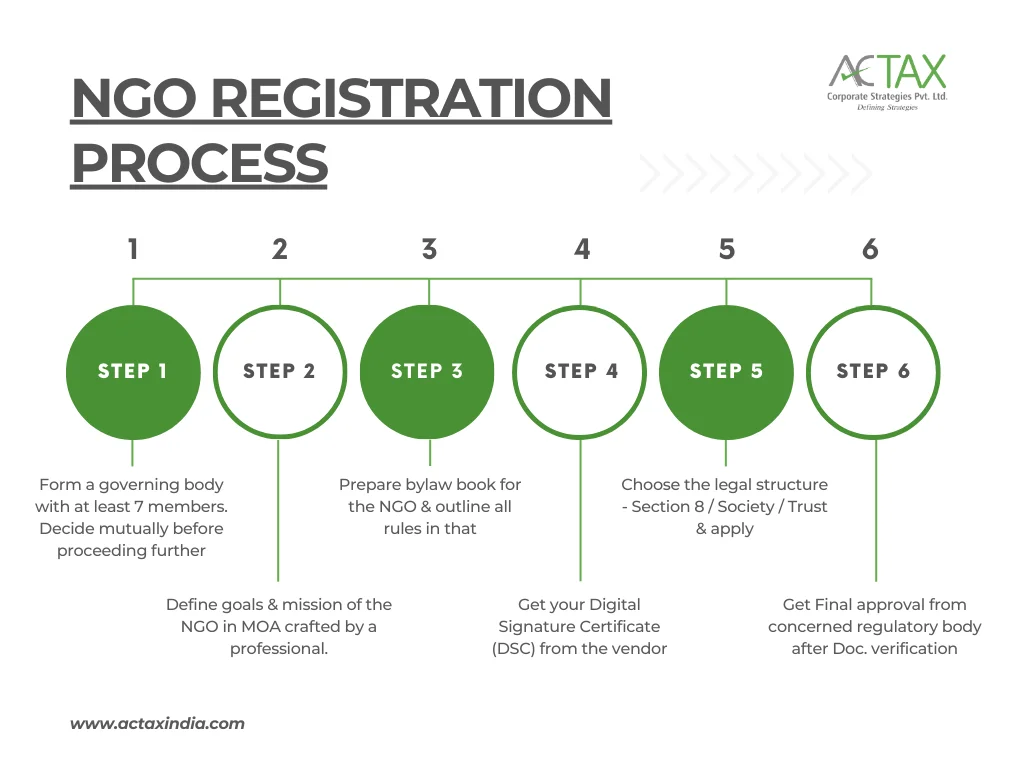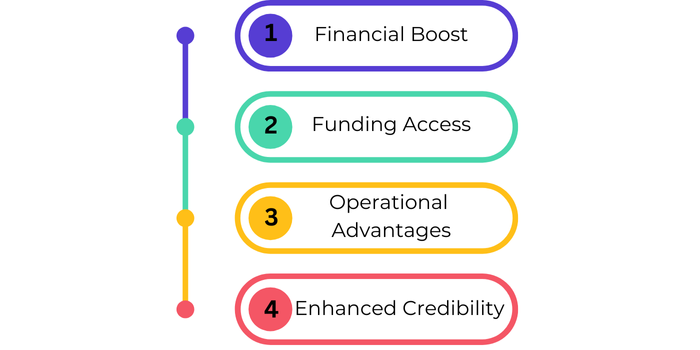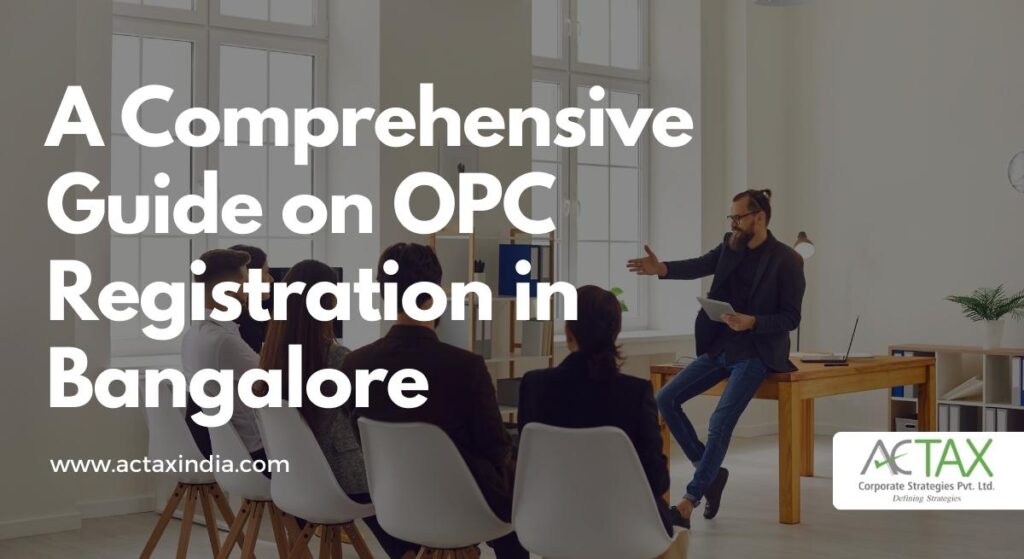Like any other state in India, NGOs immensely contribute to social development in Karnataka. By championing causes that directly affect people’s everyday lives, NGOs run the gamut from alleviating poverty and educating people to fighting for access to healthcare and protection of the environment.
There are many advantages of registering an NGO, including giving better credibility, better eligibility for tax exemptions, grants, and funding opportunities and resources.
This blog is a simplified guide for the NGO registration process in Karnataka, so anyone interested in setting up NGO can follow.
Table of Contents
NGO Registration Process in Karnataka: Everything You Need to Know
Since 1970, we have seen exponential growth in the number of NGOs registered in India. In 1970, there were only 250 NGOs, while in 2020 only we have seen 6,728 new NGO registrations throughout India. Now, India is home to 3.3 million NGOs as per 2024 data. This signifies the growth & need of NGOs in India. The primary reason observed for the growth in NGOs is the government policies towards the social upliftment & growing corporate ecosystem.
Some of The Verified Data About NGOs in India for Your Understanding –
- Uttar Pradesh tops the list of states with the most number of NGOs in India, with a total of 5,48,000. Maharashtra is in the second of the list with 5,18,000 NGOs.
- There’s no specific & updated data available about the number of NGOs registered in Karnataka, yet here’s what we found – there are 10,290 registered NGOs in Karnataka as of October 2023.
- Due to stringent regulations by the Foreign Contribution Regulation Act (FCRA), the actively working NGOs are limited only to 1,64,000, showing the need for more transparent & genuine operations by NGO in handling funds.
What Are The Benefits of NGO Registration in Karnataka?
Just like the advantages of LLP Registration, the key benefits of the NGO registration process in Karnataka are as follows:
1. NGO Provides Financial Boost
To avail of tax benefits under Sections 12A & 80G of the Income Tax Act, you first have to register your trust. This means you would retain more money to fund your objectives and goals (in Karnataka) without distracting them with the creation of a social enterprise.
Non-governmental organizations (NGO) that are registered enjoy certain privileges, for instance, those earning revenue are not subjected to income tax payment, which implies that more funds can be plowed back into society (Section 12A).
The donors can get tax exemption on the amount that they donate to your NGO and this makes them more inclined to donate to your organization (Section 80G).
2. You can get funding from Government Grants
With NGO status, you are in a position to access government grants that are meant for all sorts of NGO alliances with goals similar to your own in the field of social welfare. This paves the way for huge funding possibilities.
3. Take the Operational Advantages Offered To NGOs
Incorporating an NGO also offers various benefits to the governing body members, especially those registered as Societies & Section 8 companies. This means they can afford to concentrate on their work with no individualized fiscal exposure.
Savings accounts could be opened that are specific for the cause to ensure no merging of funds and to facilitate the collection of funds. This enhances the confidence of the donors along with ensuring the proper use of the funds given to the charitable organization.
4. Enhanced Credibility with NGO Registration
NGO/Section 8 Registration creates credibility in the eyes of donors, potential beneficiaries, and other potential partners, making your NGO more credible than others that are not registered. This can lead to the formation of new partnerships and can even mean enhanced cooperation, and consequently, more social relevance.
What Are The Types of NGO Structures in Karnataka?
As Shafna Shivakumar mentioned in her article, the most common mistakes people make while registering an NGO are choosing the wrong legal structure.
With no right knowledge about the NGO structure & if you choose the wrong legal structure, that can affect an NGO’s ability to fulfil its actual vision & might lose better access to certain benefits.
In Karnataka, There are Three Primary Legal Structures for NGOs:
1. Societies
This is the most common and simplest structure for NGOs in Karnataka because there is minimal bureaucratic interference in the activities of the organization. It is flexible and, albeit, quite simple to register. Most suitable for the perfectly defined small NGOs.
2. Trusts
It is appropriate for NGOs with a particular mission, which usually involves overseeing a charitable foundation (financial assets for a given cause). It has a formal organizational structure for managing its activities. It might also appear to have a more rigorous registration process than societies.
3. Section 8 Companies
It is a form of business entity with the main aim of having a social responsibility. It provides more flexibility than societies and trusts, and the transactions of the organization can easily be traced as opposed to societies and trusts.
It is best applied to organizations that are somehow larger with a more complicated operation. The registration of Section 8 companies might take more time than the other categories of NGOs. You can learn more about the Section 8 regulatory compliance requirements written by our experts here.
How to Choose the Right NGO Structure in Karnataka?
The first step of the NGO registration process in Karnataka begins with this.
Choosing the correct legal type for your NGO in Karnataka is significant to its functioning and development.
Here’s a breakdown of the factors to consider:
Consideration | Section 8 Company | Trust | Society |
Size & Complexity | Well-suited for larger, complex operations | Suitable for specific purposes or managing endowments | Ideal for smaller, focused NGOs |
Size & Complexity | Board of directors similar to for-profit companies | Dedicated management structure with trustee board | Simpler structure, potentially less centralized control |
Tax Benefits & Registration | More involved registration process | Generally simpler registration | Simpler registration process |
Best For | Larger NGOs with complex operations, desiring greater flexibility and transparency | Specific purpose, managing endowments | Clear focus, smaller NGOs |
Actax India is a leading consultancy specializing in NGO registration and legal compliance. Our experts can guide you, analyze your needs, and recommend the best legal structure for your Karnataka NGO. You can book a free consultation from our experts for NGO registration.
Book Consultation With Our NGO Compliance Experts!
Simplified Guide For NGO Registration Process in Karnataka, India

Enabling your choices for social missions requires legal support. Benefits of registering your NGO include; funding, credibility, and transparency that come with the registration of an NGO in Karnataka.
Here’s a Breakdown of the Key Steps for the NGO Registration Process in Karnataka:
Step 1: Form a Governing Body
The corporation must choose a board of directors or trustees of at least 7 members. This will be in the form of a dedicated group that will oversee your NGO’s activities and promote simple and responsible leadership.
Step 2: Define Your Goals
Develop a clear strategic plan for your NGO. To register societies and Section 8 companies, prepare a Memorandum of Association (MOA), or for the trusts, prepare a Trust Deed.
This document shall describe the mission statement of your NGO as well as the general activities and goals you have set.
Step 3: Establish Rules and Regulations
Get assistance in the formation of bylaws for the proper functioning and management of your NGO from compliance experts.
These rules will outline the key areas of decision-making, the running of meetings, and the handling of financial resources.
Step 4: Obtain a Digital Signature Certificate (DSC)
This one is like your online signature and you can approve the sent documents during the registration electronically through DSC.
Step 5: Apply for NGO Registration
Depending on the chosen structure, enclose the necessary documents in the proper body.
- Societies: Registrar of Societies
- Trusts: Charity Commissioner
These often comprise the MOA/Trust Deed, bylaws, a list of members of the Governing Body, and proof of the registered office.
Step 6: Get Approval
The relevant authority will go through your application. Once they are approved, the applicant is issued with a registration certificate therefore formally registering the NGO in Karnataka, and ensuring the completion of the NGO registration process in Karnataka.
What Are The Legal Compliance Required for NGO Registration Process in Karnataka?
Some of the after-registration legal compliance for a registered NGO in Karnataka are as follows:
Compliance | Description | Authority |
Maintaining Account Books | Properly record all income and expenditure for financial transparency. | Chartered Accountants |
Annual Filings |
|
|
Taxation | Maintain accurate financial records for tax filings and audits, even with potential exemptions under Sections 12A & 80G. | Income Tax Department |
Audit Requirements | Conduct mandatory audits as per size and income of the NGO (as specified by the Comptroller and Auditor General of India – CAG). | Chartered Accountants |
Internal Audits | Implement internal audit procedures for additional financial oversight and risk management. | Internal Audit Committee (established by the NGO) |
Annual General Meetings (AGMs) | Conduct AGMs to present reports, elect governing body members, and ensure member participation. | Governing Body of the NGOs |
Foreign Funding Registration (if applicable) | Register under the Foreign Contribution Regulation Act (FCRA) for receiving foreign contributions. | Ministry of Home Affairs |
Contact Actax India to get better assistance in the NGO registration process in Karnataka.
What is The Payment Structure for NGO Registration Process in Karnataka?
In Karnataka, the cost of registering a society is ₹18,000 for state-level organizations and ₹23,000 for national organizations.
A properly notarized affidavit in the approved form on ₹20/- e-stamp paper is also required by the Department of Cooperation. However, the professional fees vary based on the quality of knowledge they offer & assistance they provide during the registration process. Ideally, you should choose the best compliance experts in the market to register an NGO faster with less hassle.
Key Takeaways -
It is helpful to register an NGO in Karnataka to achieve goals that are for the benefit of society. This releases advantages such as funding, increased credibility, and promoting clarity of operations.
With the help of this guide on the NGO registration process in Karnataka and thereby choosing the appropriate legal structure for your NGO, you can successfully register it. Do not forget that Actax India is always there to guide you concerning the proper choice of structure and legal requirements.
When built to suit these characteristics, your NGO can guarantee that its emphasis is on the mission and that it positively impacts Karnataka.
![NGO Registration Process - Simplified [Karnataka] | Actax India](https://actaxindia.com/wp-content/uploads/2024/07/NGO-Registration-Process-Simplified-Karnataka-1024x559.webp)






